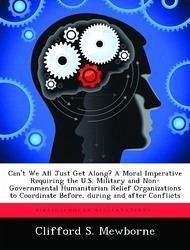What moral obligations does the U.S. military and NGOs have toward one another on the battlefield? The military and NGOs actually have a moral imperative to coordinate their efforts before, during and after conflicts. Not doing so will result in delaying the accomplishment of their missions and, quite possibly, result in long-term mission failure. Cultural differences between the military and NGOs cause the majority of the tensions which, at best, certainly exacerbate coordination if not inhibit long-term mission accomplishment. Unless the U.S. military and NGOs address the various cultural factors impeding effective military-NGO cooperation, operations will be needlessly longer and more costly both in economic terms and, more importantly, in lives lost. The differences that exist between the military and NGOs' cultures are legion. For the purposes of this paper, I must restrict my analysis to the two most prevalent ones. The military and NGO cultures are glaringly different in the following ways: 1) concerns about neutrality and impartiality and 2) emphasis placed on planning and training. Many times the military and NGOs ignorance of one another's culture results in a lack of unity of effort. In order to create the needed unity of effort, they should develop a centralized training management institution, fully utilize the civilian educational opportunities and ensure the military incorporates NGO professionals into all levels of professional military education prior to conflicts arising. This training and coordination must continue during hostilities in order to ensure the citizenry at risk receives the benefit of the collective training. Finally, just as coordination before and during conflicts is imperative, the requirement for continued coordination and training does not end upon redeployment. Continuing the loop of education is critical to achieving long-term, sustainable mission accomplishment.








